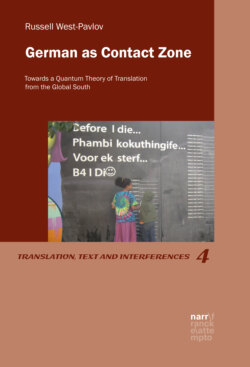Описание книги
Russell West-Pavlov is Professor of Anglophone Literatures at the University of Tübingen and Research Associate at the University of Pretoria.

Реклама. ООО «ЛитРес», ИНН: 7719571260.
Inhalt
Acknowledgements
Introduction. Rostov-Luanda-[Berlin]
Berlin coming and goings
German as contact zone
Generalized translation
Plan of the book
Chapter 1: Turning Translation
From translation in culture to culture as translation
Defending and infringing the translational border
Translation and cultural catachresis
The relationality of translation
Chapter 2: Provincializing language I: The translator as Anthropologist
Language beyond language
Provincializing language … or not
Objection 1.1: Self-referentiality, systemicity, sovereignty
Objection 1.2: Historical precursors: Enlightenment, the colonies, the Holocaust
Objection 2: The entanglement of icon, index and symbol
Chapter 3: Provincializing language II: The translator as shaman
Translation at the heart of things themselves
Interlude: Provincializing language means provincialization as process
Provincialization and porosity, translation and verbing
Chapter 4: Translation as information
Translation, information, life
The semiosphere as translation worlds
Chapter 5: Towards a quantum theory of translation
Quantum (gravity) theory
Quantum translation theory
Chapter 6: Quantizing German
Quantizing language
Quantizing German
Foreign languages in German
Chapter 7: Translating Sebald Translating Conrad
Reconnection
Translating Sebald Translating Conrad
Marlow’s grove of death
Text as contact zone
Chapter 8: Turning Translation Inside-Out: Vladislavić, Eich, Brückner
Translation and Transition
Translating Translation
Eich as translator
Chapter 9: Kinsella transposing Hamburger translating Hölderlin …
Walking
History
War
Chapter 10: Jumping on Tram 83
The near-future
Translating (or failing to translate) for the future
What says the clock?
Chapter 11: Translating Transformation: Teaching and Translating Walcott
Walcott’s ‘The Morning Moon’
The sonnet and creative constraint
Postcolonial resistance?
Landscape, teaching and translating
Chapter 12: The German Classroom as a Contact Zone
Ausländisch für Deutsche—Foreignish for Germans
Foreign languages in the German-language school
Translation in the classroom
Resonance as translation
Chapter 13: Blackboard as Fourth Wall: classrooms, racism, translation
Racism as a global phenomenon
Systemic connections
Connections: Performatives, Affect and Agency
The Classroom in the World
Conclusion: Before I die
Appendix: The Multicultural and multilingual classroom
The fate of the Federal Republic in the twenty-first century
Polylingual schools and a pluricultural society
EFL as a model for diversity learning
Ambivalent evidence from textbooks
The ‘real existing’ classroom as opportunity: what now?
Bibliography
Russell West-Pavlov
German as a Contact Zone
.....
What I am proposing, via my inaugural but patently decentred reading of Rostov-Luanda that focuses upon the almost complete absence of its elided third term (Berlin), is the centrifugal displacement—the expatriation—of German and Germany itself. The film is all about language, but at the end, language becomes mute, and takes its naturally subordinate place within the material world that is the other major subject of Sissako’s filmic gaze. This shift of emphasis does not merely work to alienate and denaturalize human language—but rather, in the final analysis, to renaturalize it and to place it in networks of productive translation. Such networks of renaturalized translation are inevitably obfuscated, tamped down and controlled by the nation state and its attendant national languages in the first instance, and by extension all language that is conceptualized as the marker par excellence of the human. The post- and dehumanization of language leads ineluctably towards the re-naturalization of language as translation within a larger framework of universal translation.
Chapter 10 embarks upon a close reading of the temporal models proposed by the Congolese author Fiston Mwanza Mujila’s frenetic novel Tram 83 (2014). The reading suggests that Mujila provides a template for a temporal regime apposite for Global South polities in semi-institutional collapse, typical of the post-Structural Adjustment Policies (SAPs) and post-civil-war polities of some parts of Africa (Mujila is de facto describing post-2000 Democratic Republic of Congo [DRC] whence he hails). Mujila’s project mobilizes a form of temporal translation that is highly relevant not only for the post-apocalyptic polities of the Global South, but also for the pre-apocalyptic societies of the Global North, for whom, according to some readings, the South provides a grim future roadmap. The temporal template Mujila’s prose embodies is effectively and affectively very close to that described by quantum translation. In the light of this temporal template and its translative resonances, the chapter critiques the German translation of Tram 83 for the way it systematically undercuts Mujila’s project of temporal translation.
.....